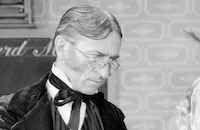Young and Willing
Brief Synopsis
Cast & Crew
Edward H. Griffith
William Holden
Eddie Bracken
Robert Benchley
Susan Hayward
Martha O'driscoll
Film Details
Technical Specs

Synopsis
Norman Reese, George Bodell, Tony Dennison, Marge and Kate Benson and Dottie Coburn are struggling actors sharing a New York apartment, which the wealthy Dottie pays for with an allowance from her father. They have been rehearsing a murder-mystery play that their scatterbrained landlady, Mrs. Garnet, found in the building and hope to use it to get the attention of their neighbor, Broadway producer Arthur Kenny. Kenny, however, has taken an apartment in the old building so that he can secretly pursue his true avocation, gourmet cooking. One day, Dottie's straightlaced cousin, Muriel Foster, visits and, shocked by her relative's living arrangements, contacts Dottie's father, who comes to see how his daughter is spending her allowance. Although Norman and George, followers of the Stanislavsky acting method, leave the apartment temporarily while Mr. Coburn visits, Tony, who is secretly married to Marge, is unaware of the situation and arrives home after visiting the draft board and strips down to his underwear. Mr. Coburn is shocked by the unusual living arrangements and, after Marge reveals that she is pregnant, he insists that Dottie return home with him in a couple of days. Believing that their survival depends on Kenny, Dottie convinces him to watch their rehearsal, and he realizes that they are enacting the play he had written years ago when he first lived in the building, but lost when Mrs. Garnet evicted him. Kenny insists that they return the script, but Norman pretends to have lost it and convinces the producer to record the play on his dictaphone while they perform it. Muriel promises to fix things with Mr. Coburn so that Dottie, who is in love with Norman, can remain in New York, and they allow her to take the part of a corpse in the play. Because she cannot keep still, however, they put some of Marge's medicine in a glass of water Muriel requests and she falls unconscious. When the police arrive to investigate neighbors' complaints about an apparent murder taking place, they discover that Muriel has been drugged and Dottie's father angrily refuses to let her remain with her friends. A couple of days later, Mr. Coburn is still insisting that Dottie leave, and Kenny replays the tape for the rest of the group. The roommates realize that their poor acting is laughable and they are hopeless until Kenny hires them for an actual production of the play, which he recognizes is now burlesque, and insists that Dottie be cast because she is a true comedienne. Meanwhile, heartbroken Dottie, who is about to leave New York, escapes from her father and returns home to a happy Norman, who suddenly realizes that he has fallen in love with her.

Director
Edward H. Griffith
Cast

William Holden

Eddie Bracken

Robert Benchley

Susan Hayward

Martha O'driscoll

Barbara Britton
Mabel Paige
Florence Macmichael
James Brown
Jay Fassett
Paul Hurst

Olin Howlin

Billy Bevan
Barbara Slater
Laurie Douglas
Blanche Grady
Lynda Grey
Louise Laplanche
Judith Gibson
Cheryl Walker
Kenneth Griffith

Fay Helm
Lora Lee
William Cabanne
Betty Farrington
Crew
Edmund Bernoudy
Hans Dreier
Ernst Fegté
Lee Frederic
Edward H. Griffith
Edith Head
Don Johnson
Harold Lewis
Leo Tover
Virginia Van Upp
Eda Warren
Wally Westmore

Videos
Movie Clip


Film Details
Technical Specs

Quotes
Trivia
Notes
The working title of this film was Out of the Frying Pan. Florence MacMichael recreated her stage role for this film. According to Hollywood Reporter news items, Paul Jones was slated to produce, Mercedes Hughes was considered for a role in this film, and female wrestlers Valda Raymond and Cleo Drakes were cast in the film. Raymond and Drakes's appearance in the final film has not been confirmed. In 1942, Paramount sold the distribution rights to a group of films to United Artists; this film, which bore the name "Cinema Guild Productions" in the opening credits, was included in that package.












